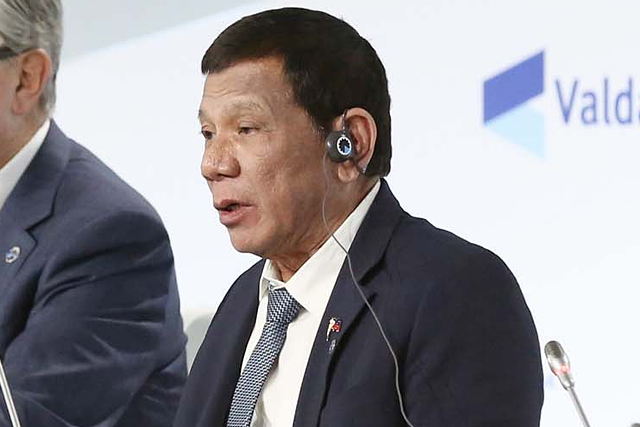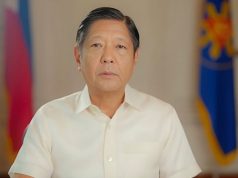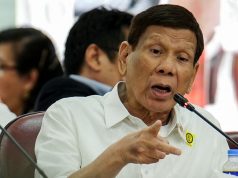
President Rodrigo Duterte was once again requested to wrap up his raving speech at a think tank forum in Russia, the second time he was asked to do so before a foreign audience abroad.
The chief executive attended an annual forum of the Valdai Discussion Club which tackles international relations in Sochi on October 3, Thursday.
Diplomats, government officials, policymakers, international experts, academicians and journalists attended the event.
According to reports, four world leaders were able to participate in the forum and gave speeches—as well as their insights—during the question-and-answer portion of the program.
Those who attended are Duterte, Russian President Vladimir Putin, Jordanian King Abdullah II, Kazakhstan President Kassym-Jomart Tokayev and Azerbaijan President Heydar Oglu Aliyev.
Duterte answered two questions but he failed to get to his point before he ran out of time. The first question was about the Philippines’ foreign policy shift to China and Russia while the second one focused on his opinions about the east-west divide.
The chief executive answered the first question by mentioning the country’s war on drugs, human rights groups, religion and how Western countries impose conditions when the Philippines purchase firearms and helicopters.
He was cut off by the moderator after around 20 minutes but Duterte asked if he had any more time left.
“I’m sorry for intervening, but maybe we go ahead and come back to you,” the moderator said.
Putin then asked Duterte about his insights on the gap between the East and the West, which led the latter to talk about colonies and propaganda supposedly perpetrated by the West.
However, the moderator once again requested for him to conclude his remarks after a while.
“Mr. President, can you wrap up?” he asked.
‘Please conclude speech’
This was not the first time that Duterte has been asked by a foreign audience to cut his statements short.
The incident has prompted Twitter users to recall the famous incident where he was asked to “conclude” his speech at a conference in Japan, a country known for highly regarding punctuality and time efficiency.
Previously in Japan: “Please conclude speech.”
Now in Russia: “I’m sorry for intervening, but maybe we go ahead and come back to you.”
“Mr President, can you wrap up?”
— TheEmperor (@Eric_Cabahug) October 4, 2019
In his four-day visit in June, the chief executive was asked to “conclude” his speech in Nikkei’s Future of Asia conference.
Duterte didn’t follow his script throughout and instead talked about the maritime tensions with China involving the West Philippine Sea.
A note was discreetly given to him but he read it out loud and said, “If you are doing business, why should you go there? And… Please conclude speech.”
Nikkei said that Duterte was only able to deliver “half of his prepared remarks” at that time.
The chief executive is known to go off-script in his speeches and has the tendency to go on tirades about issues that bother him, even if it is not related to the topic at hand.
This, in turn, makes his speeches last for hours.
Philstar.com reported that his addresses would last from two to four hours during his early years in office.
His third State of the Nation Address in July 2018 lasted 120 minutes or two hours marked by off-the-cuff comments and over 20 expletives.
Importance of brevity
Being concise in speeches and public presentations is a “quick way to be memorable” to your audiences, according to a non-profit leadership development provider.
“Regardless of how brilliant or compelling a speaker’s material is, audiences get downright annoyed when speakers are long-winded or go over their allotted time,” the American Management Association noted.
“In these cases, even if the content is stellar, the takeaway is a less-than-stellar impression. When people use the words ‘brief and to the point’ to describe a speaker or presenter’s performance, it is usually high praise,” the organization added.
The American Management Association said that brevity works in speeches since people have short attention spans, especially nowadays where we want things to be done in haste or as quickly as possible.
According to a research conducted by psychologist Dianne Dukette and physician David Cornish, adults can only maintain 20 minutes of sustained attention.
Within the allotted time, the audience must experience what they call a “stimulus change” in order for them to retain attention to the speaker.
These include changing visuals and sounds or the speaker simply shifting positions or tone.









